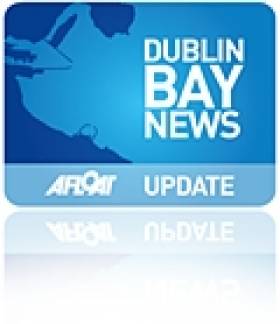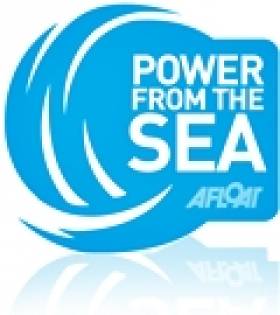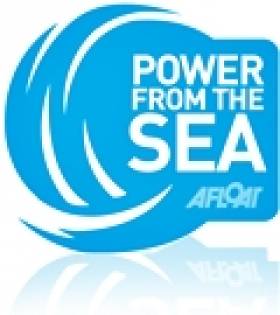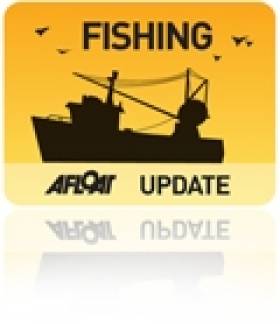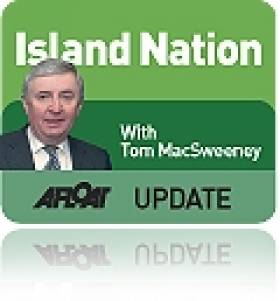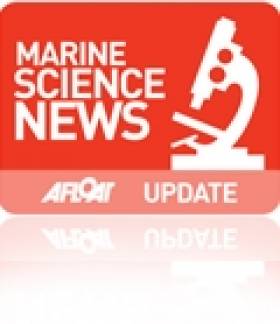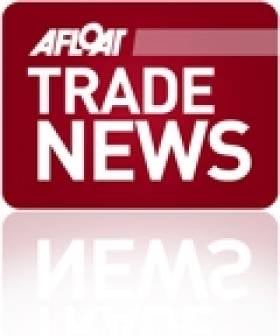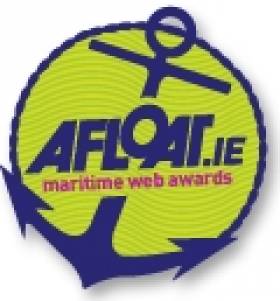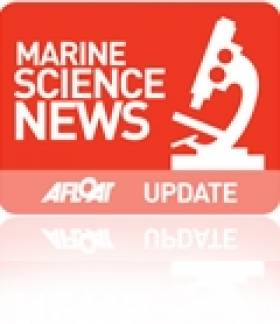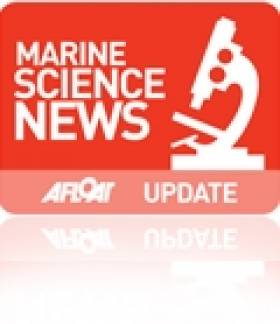Displaying items by tag: Marine
Coal Harbour Users Group (CHUG) Seek Public Marine Leisure Centre at Dun Laoghaire Harbour
#chug – The Coal Harbour Users Group (CHUG) is a group that represents the interests of leisure users of the Dun Laoghaire Harbour & Boatyard, and also the interests of the public that use the resource. Consistent with this, CHUG wish to promote marine related leisure and sport activity for the "ordinary person" in the Dun Laoghaire area and in Dublin Bay. During April 2015, CHUG made a submission to the Dun Laoghaire Cruise Stakeholder Group relating to the proposed new ships berth within the harbour. Part of the submission suggested development of a Marine Leisure Centre in the area west of the West Pier, and suggested that some of the spoil that would result from proposed harbour dredging be used to reclaim and extend land there to accommodate the development.
Kevin Woods writes that CHUG members have viewed the DLR Draft County Development Plan 2016-2022. In the context of the plan, CHUG make the following comments and requests:
CHUG request that the area immediately west of the West Pier including the area known as "The Gut" be designated for marine pleasure, leisure, sport and education use. The development would principally include:
A public marine leisure centre operated along the lines of a municipal leisure centre. This is detailed below.
A new public slip suitable for use by small boats at all tides. There are few public slipways in the Dublin area, and of those, some are not usable at low tide. An additional slip would improve public accessibility to the water and to Dublin Bay in general.
Additional space for marine leisure use, including for storage and repair of small boats and equipment. This might be provided by land reclamation in the area shaded and marked (1) on the attached map.
While the above development appears to be in line with existing Draft Development Plan SLO 14 and SLO 95, these might be reviewed and revised as appropriate should this be necessary to carry out the above. This might be assisted by introduction a new SLO relating to the area marked (1) west of the West Pier along the lines of the following:
Objective to promote water related leisure, sport, education, training facilities for public use at the coastal fringe in the area know as The Gut to the west of the West Pier that may include the reclamation of land and also the development of a new breakwater projecting westward from the pier side. This proposal would be subject to a feasibility study, including an assessment of any options, access considerations and impact on adjoining users. The feasibility study would include appropriate environmental assessments including any required under the Habitats Directive in co-operation with the relevant agencies.
A Marine Activity Centre might include:
Club facilities - offices, store rooms.
Shared meeting room, training / education room, changing room / showers / WCs.
Drying room for wetsuits,
Diving equipment store room
Compressor room for filling diving cylinders.
Small boat repair workshop
Shelters for persons, equipment
Hardstanding for secure dinghy & rib parking, canoe / kayak, windsurf and paddle board storage, small craft trailer storage.
Car, coach / minibus parking.
The centre might also cater for:
Fishing, birdwatching, and nature related activity, and might be a base from which the following would be organised:
Training in water safety
Transition year and primary schools activities
Beach and marine nature, ecology, and environmental study activity.
Marine related art
Youth club facilities
A new scout den
A marine interpretive centre / marine history and heritage centre
Marine Renewable Energy Sector Worth €9 Billion by 2030
#powerfromthesea – Ireland's marine renewable energy sector could ultimately be worth as much as €9 billion by 2030, and be supporting thousands of jobs on the island, according to Energy Minister Alex White. Speaking at the Marine Renewable Energy Ireland (MaREI) Industry Day, in Ringaskiddy, Co. Cork, Minister White also said his department's support for research and development in ocean renewables would increase by almost €17 million between 2013 and 2016, bringing it to over €26 million.
Minister White said Ireland had the potential to become the international focal point of the international marine renewable industry. He was in Ringaskiddy to perform the 'topping out' ceremony at the UCC Beaufort Building, which will be the hub of the Marine Renewable Energy Ireland (MaREI)from summer 2015. With up to 135 researchers, the Beaufort laboratory will house the world's largest group of marine renewable energy researchers.
Minister White said: "Ireland has a landmass of around 90,000 square kilometres. Our sea area is ten times that size, and it represents one of the best offshore renewable energy resources in the world. The development of Ireland's marine renewable energy sector will contribute to the generation of carbon-free renewable electricity. In the process, it will enhance the security of Ireland's energy supply, deliver green growth, and add to the 47,000 jobs already supported by Ireland's energy sector.
"Over time, the introduction of ocean energy into Ireland's renewables portfolio will result in an indigenous ocean sector with significant economic and employment benefits. You and your industry will be central to making these potential benefits a reality. Exchequer support for ocean research, development and demonstration has been increased. Between 2013 and 2016, €16.8 million was added to my Department's multi-annual ocean energy development budget, bringing the total cumulative funding to €26.3 million."
Minister White quoted the Sustainable Energy Authority of Ireland and Invest Northern Ireland, whose recently-published Economic Study for Ocean Energy Development in Ireland found that a fully-developed ocean energy sector could be worth as much as €9 billion, and be sustaining many thousands of jobs on this island, by 2030.
Minister Sean Sherlock in 2013, announced €19 million in SFI funding for MaREI, when he was Minister for Research and Innovation. This was matched by €10.5 million in industry funding.
Marine Energy Activities Boosted With Extra €4.2m in EU Funding
#powerfromthesea – Minister for Communications, Energy & Natural Resources Alex White T.D. welcomed the announcement that the SFI Centre for Marine Renewable Energy Ireland (MaREI) had successfully raised an additional €4.2 million in funding from EU research funds for marine energy activities.
The announcement of the substantial EU funding was made to an audience of more than 130 industry and university representatives involved in a variety of marine energy research projects, attending the MaREI Industry Open Day at the National Maritime College of Ireland in Cork.
"I want to commend MaREI on their success in securing substantial EU support to fund their very important research and development work. It is truly laying the foundations for both the energy system and economic opportunity of the future."
Speaking at the MaREI Industry Open Day, Prof. Mark Ferguson, Director General Science Foundation Ireland (SFI) and Chief Scientific Adviser to the Government of Ireland added, "MaREI is one of twelve SFI Research Centres of excellence and impact in Ireland. Research undertaken at MaREI is positioning Ireland to play a leading role in marine renewable energy research which is an area of significant national strategic importance. In its first year MaREI has delivered on the targets which we have set. I look forward to a successful year ahead for MaREI, in terms of new industry partnerships, leveraging funding and new discoveries that will deliver solutions that can benefit both Irish society and the economy."
Prof. Conchúr Ó Brádaigh, Director of the MaREI Centre said that "Large and small companies alike are engaging with MaREI across a huge variety of business opportunities from marine robotics and new materials to endure ocean conditions, to offshore wind, wave and marine energy and mooring devices as well as aquaculture and grid technology solutions. The additional funding from the EU will serve to further position MaREI at the forefront of marine renewable research and commercialisation of this research globally."
The industry-academia MaREI Centre comprises over 45 industry partners, including global market leaders in energy, marine technology, software and hardware providers. Academic partners include lead partner University College Cork along with Cork Institute of Technology, University of Limerick, NUI Galway, NUI Maynooth, University College Dublin and the Marine Institute.
"MaREI will directly create companies and jobs and serve as a catalyst for Ireland to establish a safe, sustainable and profitable energy supply for domestic use and for export," said Professor Anita Maguire, Vice-President for Research and Innovation at University College Cork.
Minister Alex White also toured the €15 million UCC Beaufort building, performing the customary "topping out" ceremony, which marks the final phase of building works. Beaufort will house the MaREI centre on its completion in July 2015.
The MaREI Centre initially received government support of €19 million through Science Foundation Ireland (SFI) and a further €10.5 million investment from industry partners. The Centre supports job creation in the in marine renewables sector, while also making Ireland an international focus for the marine energy industry. Almost 90 jobs in the field of marine energy and maritime projects were recently announced by Minister for Agriculture, Food, Marine and Defence Simon Coveney, T.D. for the Cork Harbour region, and MaREI is heavily involved in supporting these companies and the related jobs.
Budget Dishes Up €11.5m For Fishery Harbour Works
#budget2014 – The Minister for Agriculture, Food and the Marine Simon Coveney TD today announced details of his Department's 2015 budget. Emphasising that despite the fragile recovery in the economy, he had secured an increase in funding for the first time since 2009. Included in the funding of the Marine sector is the sum of €11.5 million devoted to the new seafood development programme 2015, while a further €11.5 million of capital funding will be invested in fishery harbour capital works, which not only adds value and improvement to these harbours but also contributes heavily to the local economies of the areas concerned. Some €6.3 million is allocated to investments in aquaculture and fish processing projects, while close to €47million is allocated to fund the marketing and development functions of BIM, the research role of the Marine Institute and the regulatory and control functions of the Seafood Protection Authority.
'In the Wealth of the Sea Lies Our Hope' So Where is Ireland's Department of The Marine?
#marine – The Irish Maritime Administration (IMA) was established in 2013 to integrate the planning and delivery of all the maritime services of the Department of Transport, Tourism and Sport under a single national office.
The Department's website describes this as "central" to its "drive for more efficient and effective delivery of maritime services."
It is comprised of the Maritime Safety Policy Division, the Marine Survey Office, the Irish Coast Guard, the Maritime Transport Division and the Maritime Services Division.
The IMA, declares the Departmental website, "is developing the maritime transport sector, by facilitating the achievement of international safety levels and by enhancing infrastructure needed to secure employment in the shipping, fishing and leisure sectors."
This weekend The Irish Times reported, in the context of political appointments to State bodies, that the former Minister for Transport, Leo Varadkar, appointed three people without any sea-going experience to the Marine Casualty Investigation Board.
This story has not been denied. The appointments have been defended with the explanation that they were "ensuring that there could be no conflict of interest," according to a Department spokesman. The Irish Times claimed that there was only one member of the Board who had direct marine expertise for the past year.
"No conflict of interest," what exactly does that mean in the context of investigations into marine accidents? The importance of seafaring skills or maritime experience was not highlighted in the quoted explanation from the Department.
The MCI, it seems, uses contracted experts into marine casualties whose reports are submitted to the Board.
The integrity of the individuals concerned is not at issue but it is relevant to ask why this board has had only one member with direct marine expertise.
Is the Department of Transport the correct place for maritime matters?
Moving them into that Department facilitated Government policy which is against the existence of a dedicated Department of the Marine and keeps maritime affairs at a low level in State administration.
Prior to the last General Election both Coalition parties, Fine Gael and Labour, promised a single department to deal with maritime affairs. There was hope for a Department of the Marine again being created. Unsurprisingly, once they got into Government that did not happen. Marine was lumped in with Agriculture, Food and now Defence and aspects such as maritime safety and the ports went to the Department of Transport. Other parts of the maritime brief were put into other Departments, such as Communications and Energy and some seemed to have been lost altogether!
The Government, politicians and officials under the leadership of Taoiseach Enda Kenny, who has several times highlighted his maritime heritage in public, did not see maritime affairs as important enough to merit a full department in an island nation, a country where 95 per cent of exports and imports depend upon the sea.
When he was appointed Minister for Agriculture, Food and the Marine, Simon Coveney, who does have a commitment to maritime affairs, declared that he wanted the maritime aspect of his brief and his title as Minister for the Marine to be publicly recognised. He also indicated his desire to have all maritime matters brought under his department. That did not happen. The Department of Transport strengthened its grasp on aspects of maritime affairs. The establishment of the Irish Maritime Administration within the Department of Transport last year was a further attempt, in my view, to frustrate any possibility of the building up of a strong Department of the Marine.
Several years ago, when Marine Correspondent with RTE, I noted the strong representations a number of ports and exporters to be have them moved out of the then Department of the Marine and into Transport. There was public and private lobbying through the Ports Association and other bodies. It was maintained that Transport would give the ports and all involved with them a stronger position nationally. It seemed that the marine department was regarded as too lowly within governmental structure.
I once sat in the office of a senior politician in Dublin who, under a previous Government administration, had been appointed Minister for the Marine at a time when Ireland had such a dedicated Department. He had waxed lyrical about his family's political tradition and then told me that he was stuck with being the 'minister for fish and ships' but he would have to 'suffer for a while' with that indignity until he could get a more senior post. The man filled me with disgust, but his attitude was indicative of many Irish politicians who have shown little respect for the marine sphere of a nation which has produced mariners of international renown.
The marine sector is so diffused now that it does not have the power or political clout which it merits. That the government has advanced plans such as Ocean Wealth as a means of driving maritime development, does not counteract the lack of a single maritime department. This is not good for maritime affairs in an island nation where they should be a priority.
I have been considering all of these points and others following the inaugural Irish Maritime Forum held at Cork City Hall. It was well-organised by Cork Port, with sponsorship from Liebherr, the German crane manufacturer based in Killarney. There was a big attendance. The presentations were accompanied by the usual audio-visual displays, all aimed "at organisations and professionals within the maritime industry in Ireland" The promotional brochure said: "This forum will look at 'Developing the dynamic future of Ireland's Maritime Sector' by exploring the ocean of opportunities that exist within the sector and concentrating on the key drivers that are set to change the sector in the future. Breakout sessions will explore further the drivers of change within the transport sector and the opportunities and challenges that exist. The forum will provide a unique platform of national and international speakers each bringing their own expert knowledge and experience to the forum."
"Key drivers of change... dynamic future... breakout sessions...." nicely-put management and marketing 'speak' ... There were good presentations, ideas suggested and, it was interesting to hear from international speakers of practices and developments, based on their experience.
There is not a shortage of maritime-themed conferences. What do they practically achieve?
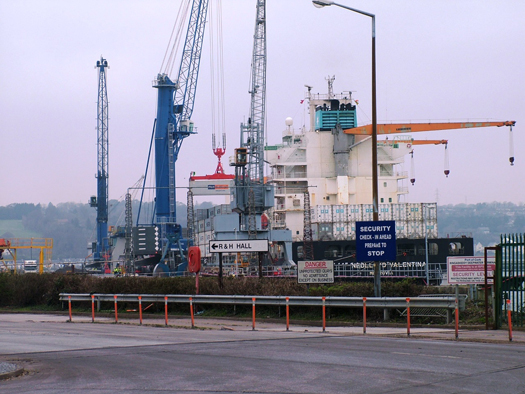
Containers unloading at the Port of Cork. Cork has already begun using the existing deepwater port at Ringaskiddy to ship containers
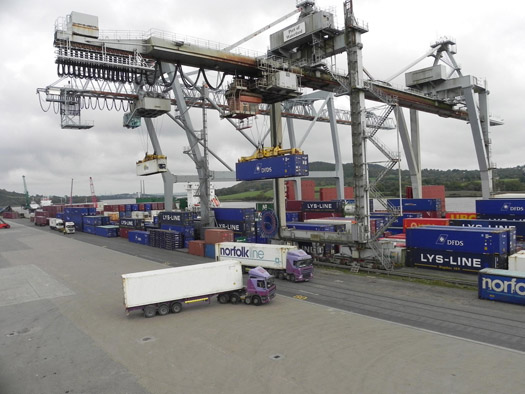
Waterford Port's dedicated container terminal at Belview. The port opposes Cork's attempt to build a new container port at Ringaskiddy
Ireland's major ports compete with each other, which suits the Government that seeks to avoid financial responsibility for them. So you have situations such as where Cork Port wants to build a container port in the lower harbour at Ringaskiddy, which Waterford Port, having developed its own container port at Belview outside the city, opposes at a planning hearing. Galway wants to develop a major port facility, claiming the Western coastline should have modern port facilities and attract more cruise ships. Other major ports are lobbying against this and being both critical and dismissive. Dun Laoghaire also wants a future in cruise liner visits. Dublin Port is less than happy with this. Cork claims to have the only dedicated cruise line terminal in the country, but as was stated at the Cork maritime conference, cruise shipping operators have no loyalty to any port and will go only where the best deals are offered to them, to cut their costs as much as possible.
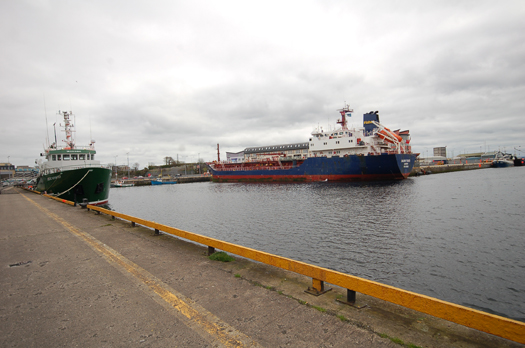
Galway wants to build a new port
While Dun Laoghaire is a major leisure marine centre, its Harbour comes in for strong criticism in the survey of the Irish Cruiser Racing Association into this year's national championships held there. The criticism focusses on what the ICRA report describes as the insistence on charging marina fees to visiting boats, something never done at other championship events around Ireland to participating boats, an attitude which visitors found unhelpful and discouraging.
If all maritime affairs were concentrated in one Department it would make them a priority in this island nation. They include and range across all aspects of the nation's life, from the sea around us, to the inland waterways, the ports, energy creation from marine sources, the fishing industry, angling, marine tourism, history, culture, all are part of a nation where people first came to the coastal areas some 9,000 years ago.
A Department of the Marine should be a leading, top-level Department of Government in this island nation. It would be economically important, could create employment, could drive development across a wide range of activities with benefit to the nation. Instead, narrow-minded, self-centred thinking and lack of foresight continues to restrict the progress of maritime affairs, causes duplication of effort and keeps marine affairs at a low national level.
I like the motto of Arklow, that County Wicklow coastal town with a great maritime tradition. As Gaeilge it reads: "Maoin na Mara are Muighin," which translates to: "In the wealth of the sea lies our hope."
That motto came to my mind at Cork City Hall, as I listened to the speeches and questions at the Irish Maritime Forum, but even that title raised the issue of duplication. It was chosen, as far as I remember, as the title for an organisation established a few years ago, by a group of mariners who formed - The Irish Maritime Forum.
Until next week, the usual wish of ..... "fair sailing" ........
Twitter: @Tom MacSweeney
Irish Scientists Contribute to New World Class Offshore Geological Atlas
marineatlas – #Scientists from the Geological Survey of Ireland and UCD have contributed to a new Geological Atlas of the offshore geology of north-west of Europe, which will be launched today at the Geological Survey of Denmark, Copenhagen. The Atlas and associated database was jointly developed by 8 geological surveys and sponsored by more than a dozen exploration companies at a cost of €4 million, and is expected to result in increased exploration activity and research.
The full name of the Atlas project is the Northeast Atlantic Geoscience Tectonostratigraphic Atlas (NAGTEC) and GSI's involvement grew in partnership the NAG consortium, which is a cooperative framework agreement between the Geological Surveys of Ireland, Northern Ireland, Great Britain, The Netherlands, Germany, Norway, Iceland and Denmark (including Greenland and the Faroe Islands).
This hugely ambitious project began in June 2011, and in its 3 year lifespan has successfully correlated all released offshore data for the entire north-east Atlantic, for the very first time. Using this resource, skilled experts based at the various NAG surveys developed data products, primarily geological maps that detail the development of the North East Atlantic. These maps are now available for scrutiny amongst the NAGTEC Atlas pages, whilst the offshore data is housed in a structured database. It is worth noting that the project, undertaken by the multiple government agencies, was completed on time and on budget and met all targets.
Welcoming the launch, Minster of State at the Department of Communications, Energy and Natural Resources, Joe McHugh TD, pointed out that the long term benefits to Ireland, as a result of participation in NAGTEC are predicted to be significant:
· Datasets can be used by exploration companies to aid exploration.
· The majority of sponsoring companies are not active in Ireland but will now be more aware of Irish opportunities.
· The data will continue to stimulate research on offshore Ireland.
· This project will also highlight data and knowledge gaps for further exploration and research.
· New international research links have been forged between the surveys, which will result in more projects.
The Minster added that " this new data is also very timely in the context of the Atlantic exploration licensing round which was opened this summer and concludes in September 2015."
The Irish contribution to the NAGTEC project was co-ordinated by Maria Judge, INFOMAR Geologist at the Geological Survey of Ireland, and employed technical support from a post-doctoral researcher, Dr Kenneth McDermott, who was based at the School of Geological Sciences, UCD under the supervision of Prof. Pat Shannon. The project was also supported by the Department of Communications, Energy and Natural Resources' Petroleum Affairs Division of Ireland, who permitted access to the released offshore petroleum exploration data, from which much of the data products were generated.
The release of the atlas, to sponsoring companies initially, is timely for Ireland, as it comes after new licensing terms have been recently proposed and a new seismic data gathering exercise is underway, while another offshore licensing round will take place in 2015.
Boating has always been a part of the business for Yachtsman Euromarine, says managing director Matthew McGrory, going back to when the company began as MJ O'Neill Insurances Limited in 1974.
Started by his grandfather Matthew James O'Neill and father William McGrory, the then Clondalkin-based brokerage at first dealt with insurance across the board, marine coverage being just one facet of a portfolio that also included cars, homes and businesses.
But from this foundation, Yachtsman has grown over the decades into Ireland's leading boat insurance specialist, protecting boaters' lifestyles while sharing their passion for all things marine.
Of course, the broker's expertise in the marine business is bolstered by its consummate experience in the general insurance market.
William McGrory took the helm after his father-in-law's death in 1976, and with his son Matthew coming on board, the business was steered towards a huge leap forward in 1984.
This was thanks to a partnership with various syndicates at Lloyd's of London, which saw the company appointed as Lloyd's coverholder for the British insurance giant to underwrite household insurance in Ireland.
In the years that followed, Matthew's passion for boating saw the already established marine side of the business grow to such an extent that, by 1995, it was decided that developing a specialist market for marine insurance was the way forward. Thus the Yachtsman brand was born in May 1997.
"We obtained a second underwriting agency from Lloyd's for pleasure craft insurance," says Matthew, "and we haven't looked back since."
First-hand experience
Launching with a staff of just three, the Yachtsman brand brought to the Irish market a brand new product offering wider marine cover with a competitive edge to premiums.
But more than that, there was the firm’s small but dedicated staff - who were themselves involved in boating as a pastime, and as such had a complete understanding of clients’ requirements - which soon became recognised as a key benefit of signing up for a policy with Yachtsman.

Company founder – Yachtsman Euromarine was started by Matt McGrory's grandfather Matthew James O’Neill
The next five years was a period of significant growth for the Yachtsman brand that saw the business move from its office in Clondalkin to new, larger premises in Clane, Co Kildare.
It was also in this period that the McGrorys focused their efforts on the developing maritime brokerage and sold off the general insurance business to specialise fully in pleasure craft.
The market was expanding fast as the economy boomed, and Yachtsman was there from the very beginning to offer value-for-money policies backed up with priceless first-hand experience.
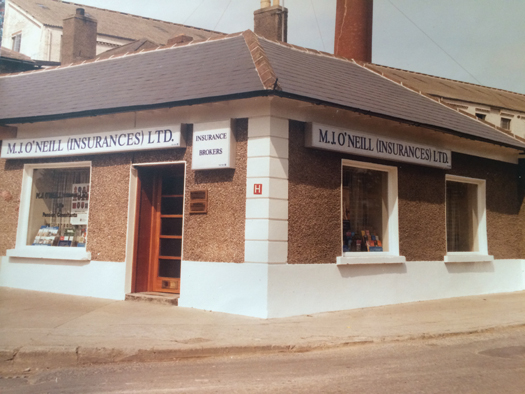
The Clondalkin, County Dublin premises of founders, MJ O’Neill Insurances Limited in 1974.
New decade, new name, new markets
The next big step for the company came in February 2005, when MJ O’Neill Insurances Limited - now trading solely as Yachtsman - bought out competitor Euromarine, growing its staff to seven and re–launching the following month as the combined brand Yachtsman Euromarine at that year’s Dublin Boat Show in the RDS.
“The purchase of Euromarine opened up new markets to us in the marine trades and yacht club sections,” says Matthew, who adds that “with the combined turnover of both companies, we now had better buying power in the insurance market, and secured underwriting authorities with the two biggest marine syndicates at Lloyd’s.”
Another invaluable asset was Bill Cullen, who oversaw Yachtsman Euromarine's continued growth throughout the ‘Celtic Tiger’ years and even now, after retiring in 2010, still keeps a keen eye on progress.
A successful business must keep evolving and developing its skills to stay ahead, and the next stage for Yachtsman Euromarine would test this to the limit. In 2010, the brokerage was appointed by the Lloyd’s syndicates to handle their marine claims in Ireland.
“The business model for this was based on a Canadian coverholder that has a similar-size turnover to Yachtsman,” explains Matthew. “After many meetings with our syndicates in Lloyd’s, we took on the task and employed two more staff, one with claims-handling experience from a local insurer and the second with a marine trade and repair background.”
As a new venture for the business, this shift into trades and repairs was not without its teething problems - no doubt exacerbated by the contraction of the boating market as the credit crunch persisted in putting the squeeze on wallets.
But the benefits would come with time, and Matthew is particularly proud that Yachtsman has the support of “a very comprehensive panel of repairers that can produce a quality repair and get the client back on the water quickly. At the end of the day, that's what's important."
The same time period would also see Yachtsman Euromarine become the title sponsor of the ISA RIB Challenge, promoting safe boating to younger budding sailors throughout the country.
But there’s only so far a business can grow in its home market, and Yachtsman would look abroad for its next leap forward.
Conquering Spain
“For a number of years we had been transacting business in Spain, primarily for the ex–pat market,” says Matthew, who adds that those new overseas contacts were put to good use in 2012 with the launch of Yachtsman Euromarine’s first Spanish-language policy to cover that local market.
Though beginning with only a small presence in Spain - a perennially popular destination for Irish retirees, holidaymakers and boating enthusiasts - Matthew says that foothold was invaluable in helping Yachtsman to identify the “massive potential” in the local pleasure craft insurance market.
The next step would be exploring how to export Yachtsman’s range of services into Spain.
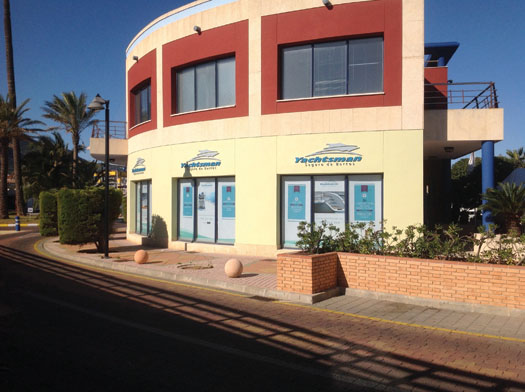
The opening of Yachtsman’s first international office in Denia, Spain in a prime position on the Costa Blanca
“To put it in context, one small geographical area in Spain has the same pleasure craft market size as the whole of Ireland,” he says. “So we began a research project into how it might be possible to take on, and manage from our office in Clane, large volumes of cover, while managing the risk-loss potential in multiple locations.”
Thanks to the support of Enterprise Ireland, Yachtsman developed what Matthew describes as an “innovative system” that allows for the underwriting of risks to take in more parameters in setting rates. "This has completely changed how premiums are calculated, and we are better able to reward policies with no claims but also pinpoint hotspots where frequent claims are becoming a concern."
Forty years at the front
Fast-forward to March of this year, and the opening of Yachtsman’s first international office in Denia, a prime position on the Costa Blanca at the midway point between Alicante and Valencia, and the main link to the Balearic Islands.
This opening also saw the hiring of the brokerage’s first Spanish staff, allowing the business to move forward in developing its products for the local market.
After the lean recession years, business is on the up again across the marine markets - and none more so than for Yachtsman Euromarine, which is celebrating a remarkable 40 years in business this month.
For Matthew McGrory, it’s a time to look back with pride at the reputation Yachtsman has earned within the industry as an authority in boat insurance, not to mention for its superior customer service and the expert advice and innovative solutions the company delivers for the marine sector.
As Yachtsman’s website simply states, they know about boats.
As for where Yachtsman goes from here? “Well, building our business in Spain will keep us busy and growing for the next few years,” says Matthew, “but then who knows? I’ve plenty of ideas!”
Contact: Yachtsman Euromarine, College Road, Clane, Co.Kildare T: 045 982668
Irish Maritime Web Awards Presented By Afloat.ie
#maritime – Getting your message across has never been easier thanks to the power of the internet. From computers to smartphones to tablets, access to the web today is almost ubiquitous - increasingly even out on the water! - and it's often the first place marine-minded people go to find whatever they're looking for, whether it's buying a boat, looking up sailing conditions or checking out a new club to join.
So it nearly goes without saying that websites are the first line of interaction with the public - the virtual shopfronts that put across who you are, what you do and how you can be of service, often at little more than a glance.
In light of this, it's no surprise that a great web presence - a well-designed usable website, topping the web search tables with active social media connections - can mean the difference between boom and bust for any business or service, especially in the current economic climate.
But since everyone else is getting on the web, too, it's becoming a lot harder to get noticed in the crowd. No longer is it enough just to look good. Winning websites must form part of a digital strategy: attracting interest, getting talked about and making an impact beyond the bytes.
What do web users want? How can we reach them? And how do we keep them coming back? That's the biggest challenge for clubs, organisations and businesses in the marine and maritime sectors in this digital age.
We at Afloat.ie know this more than anyone, which is why we've decided to recognise the best in what we and our readers see in Irish marine digital communications with the inaugural Maritime Web Awards.
We want to highlight excellence in marine websites making the biggest mark across a variety of categories, from the business end (brokerage, chandlery, ports and marinas) to those vital services (water safety, rivers and canals, watersports) for anyone who takes to the water, whether on the coasts, offshore or inland.
Nominations for the first Afloat.ie Maritime Web Awards were accepted on any and all marine-based websites via comments on Afloat.ie and on Twitter and Facebook. Selected sites were then scored for design, usability, interaction, social media, community and speed, with voting taking place with a judging panel representing our 11 award categories: Sailing, Brokerage, Chandlery, Clubs, Classes, Safety, Inland, Ports, Marinas, Watersport and Conservation.
The sites awarded below represent our judges' choices of the best of the web in Ireland's marine and maritime sectors in a landscape that's constantly shifting. But that's exactly why these sites deserve our recognition - they're keeping ahead of the curve, and will surely adapt to what changes may come in the next few months, let alone years.
So without further ado, the winners of the inaugural Afloat.ie Maritime Web Awards are...
Sailing Award
SailCork - www.sailcork.com
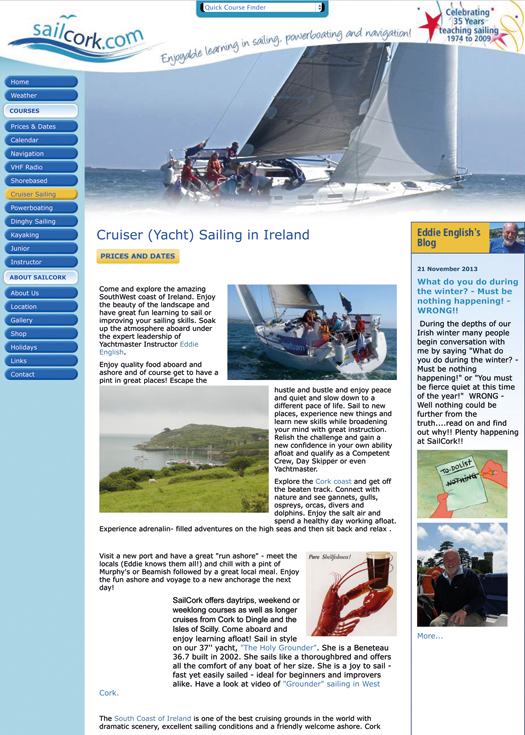
Coming in tops for its search engine ranking and easy-to-navigate website that's constantly updated with the latest course offerings and blog updates, SailCork looks forward to its 40th year in business with a Maritime Web Award in the Sailing category. Though geared towards education - with courses in navigation (including iPad navigation for the tech-minded) and radio operation among its offerings - this Cobh institution also specialises in adventure sailing holidays at home and abroad, all available at a mouse click or screen tap.
Watersport Award
Surf Republic - www.surfrepublic.ie
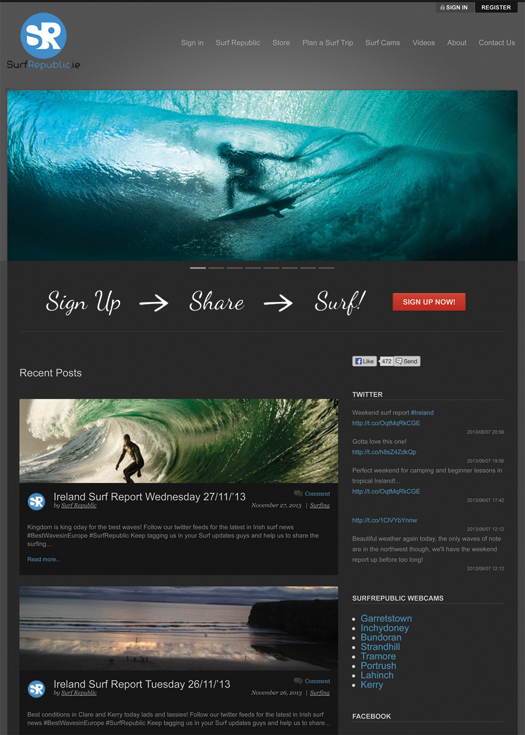
Surfing is serious business to the team behind Surf Republic, run 'by Irish surfers for Irish surfers' and built around a commitment to 'accurate Irish surf reporting, quality web cameras and advanced ocean and swell forecasts' - not to mention providing a forum for Ireland's growing community of waveriders. News? They keep things up to date so you'll never miss a swell. Social media? Get connected on Facebook and Twitter. Want to see how the water looks from wherever you happen to be? Links to eight surf cameras should sort you out!
Brokerage Award
MGM Boats - www.mgmboats.com
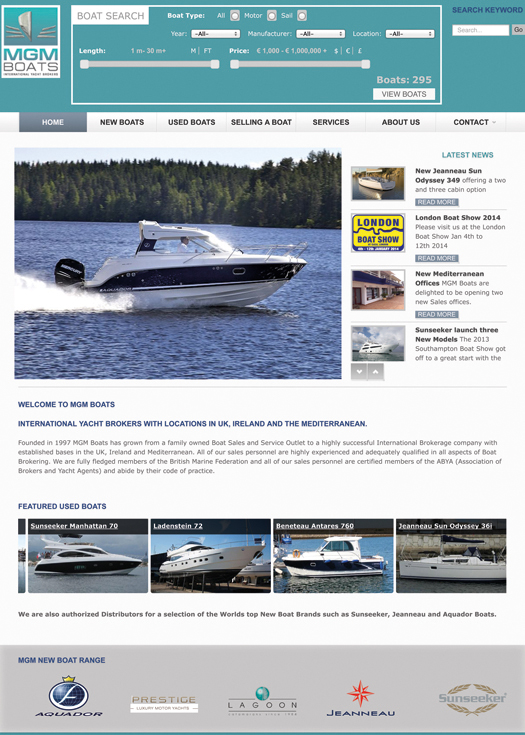
MGM Boats has been ahead of the game when it comes to expanding its boat brokerage vision from Britain and Ireland to the continent and far beyond, establishing offices in the Mediterranean and making its presence known at boat shows as far afield as Dubai and Russia. Its website takes its reach fully global, listing hundreds of new and used boats between 15 locations worlwide that can be quickly filtered by your requirements, from brand to size to price. MGM Boats makes selling your vessel easy, too, while maintenance is a doddle thanks to their various boatyard services, all fully detailed online.
Chandlery Award
CH Marine - www.chmarine.com
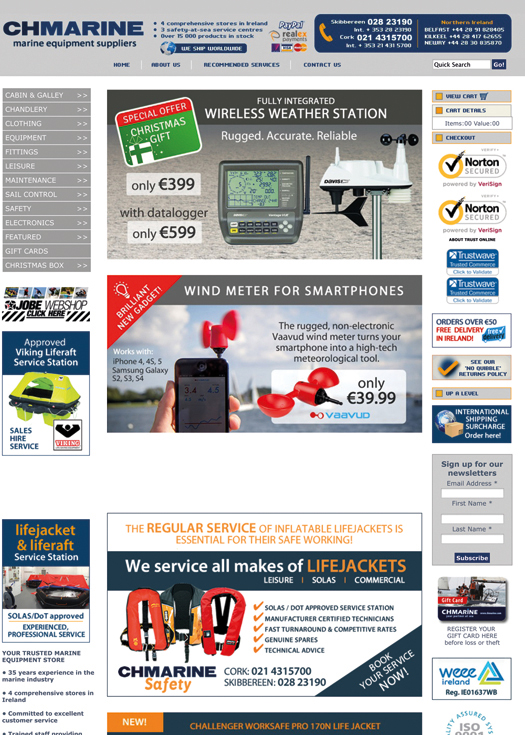
CH Marine is billed as 'Ireland's leading marine equipment supplier' and it's easy to see why, boasting as it does an impressive range of chandlery, sail clothing, the latest electronic gadgets and more, available via five walk-in superstores nationwide (in Cork, Skibbereen, Belfast, Kilkeel and Newry) and its fully stocked and browsable online shop, which provides free delivery in Ireland for orders over €50. CH Marine also ships worldwide, broadening its market considerably. The site also links to CH Marine's nationwide network of chandlery partners, making it even easier to find exactly what you want.
Clubs Award
Kinsale Yacht Club - www.kyc.ie
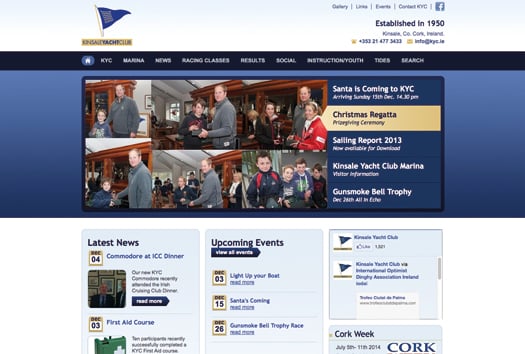
Compared to Ireland's storied yacht clubs - Kinsale Yacht Club, established in 1950, is the baby of the bunch. But does its comparative youth mean the club's more clued in to the power of the web? It's sleek, club livery themed website is certainly good evidence for that, presenting the latest news, results, reports and social connections up front - Facebook and Flickr both used well - and boasting a pagerank to make the competition green with envy.
Classes Award
Flying Fifteen Association of Ireland - www.flyingfifteen.ie
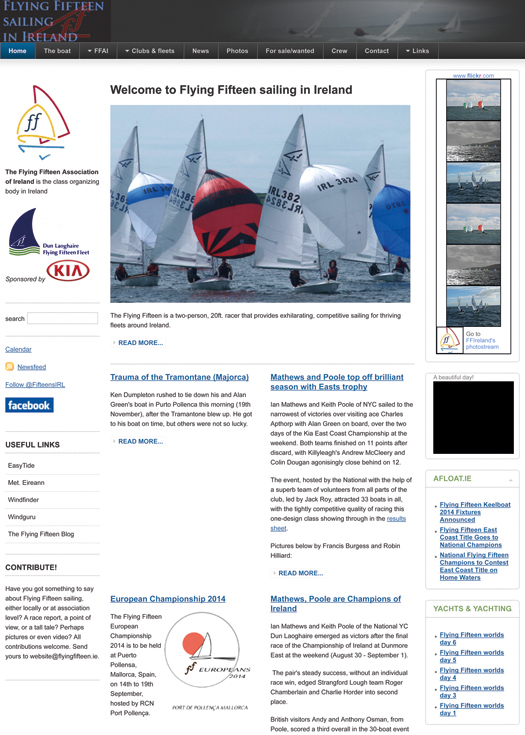
The Flying Fifteen Association of Ireland may not have the sleekest website in appearance, but they're streets ahead of their fellow sailing classes in terms of knowing how to use it. Boat specs and club details are all easy to find on the site that keeps members and the public alike regularly informed on the latest results, fixtures and other events, and engaging with the Flying Fifteen community via social media - including a Flickr page for beautiful on-the-water shots, something that should be noted by the rest.
Safety Award
Irish Water Safety - www.iws.ie
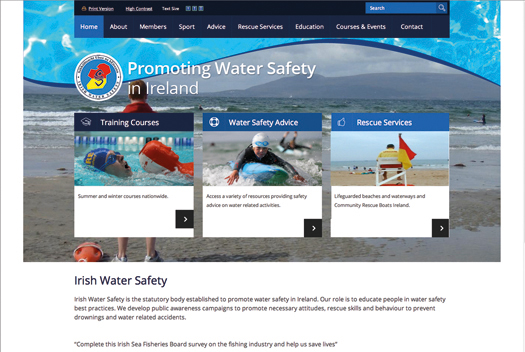
'Promoting water safety in Ireland' is the goal of Irish Water Safety, the national charity that works tirelessly to educate the public about respecting the water. After an exceptionally hot summer that saw an alarming rise in drowning tragedies, the work of the charity and the lifeguards its helps train is needed now more than ever. The first line is this website, an efficiently designed connection to nationwide training courses, water safety advice and rescue services to get the public clued in to safer behaviour at the beach, by the pool - anywhere there's water.
Inland Award
Waterways Ireland - www.waterwaysireland.org
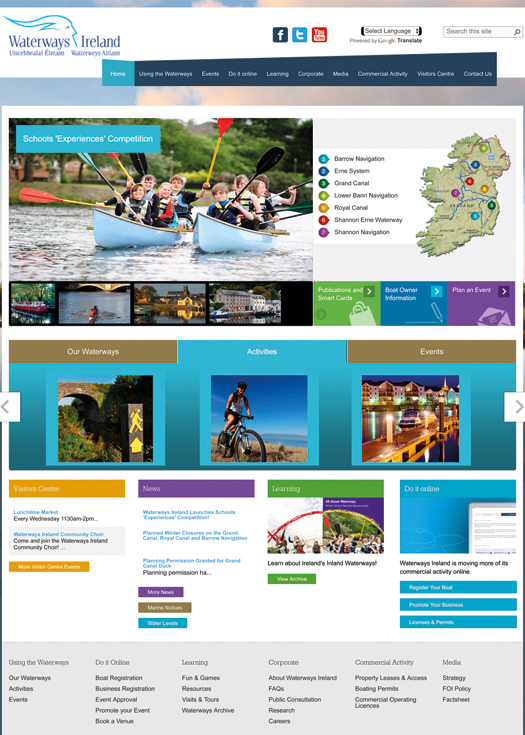
The cross-border navigation authority Waterways Ireland launched its new website earlier this year and it's a significant improvement as a resource, putting everyday usage of Ireland's rivers, lakes and canals to the fore. A colour-coded system makes distinct every one of the seven major water systems across the island of Ireland, each with its own section detailing maps, navigation info and activities. Marine notices and events nationwide are available with a single click, as are education resources and registration for waterways services. The Waterways Ireland website is doing it right.
Ports Awards
Port of Cork - www.portofcork.ie
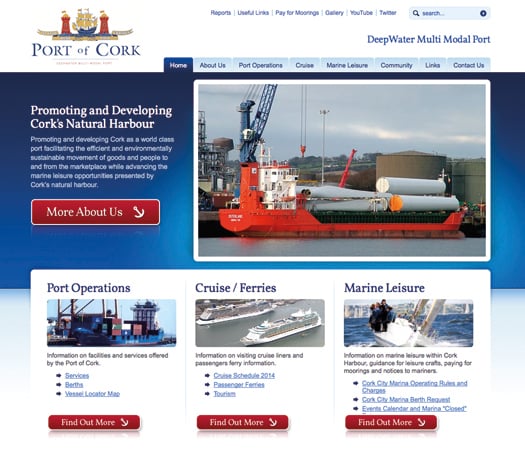
Ireland's commercial ports are well served online, but the Port of Cork website is far ahead of the class. Distilling everything one wants from a port website - shipping times and services, cruise and ferry schedules, and berthing details for visiting boaters - into a simple but effective modern and clean layout, the Port of Cork site follows the axiom 'less is more' to the correct effect. Community engagement is another important aspect, and one can't ignore the port's popular and active Twitter account.
Marinas Award
Greystones Harbour Marina - www.greystonesharbourmarina.ie
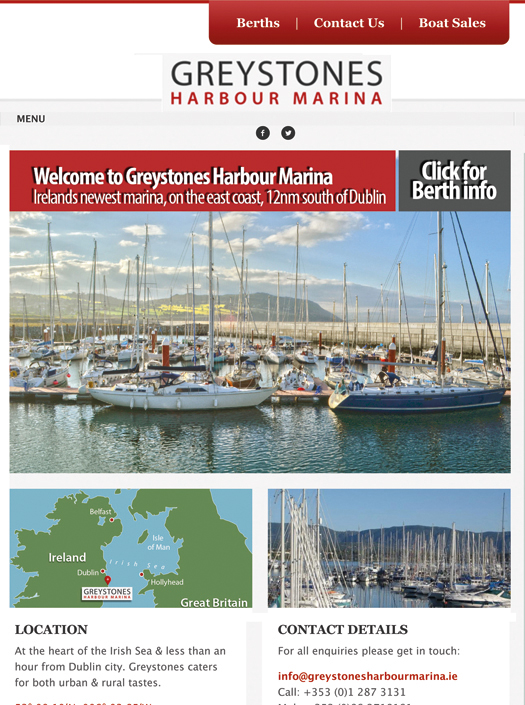
Greystones in Co Wicklow was the brightest spot on the Irish marinas map with the launch of its world-class berths earlier this year. And it's little wonder that Greystones Harbour Marina has a website to match. Cleanly designed, with direct links to details of its available berths - plus integration with boat sales partner BJ Marine - and active on social media over its first summer season, the website's doing a wonderful job of putting Ireland's newest marina on the international stage. Here's looking forward to 2014's season arrivals!
Conservation Award
Irish Whale and Dolphin Group - www.iwdg.ie
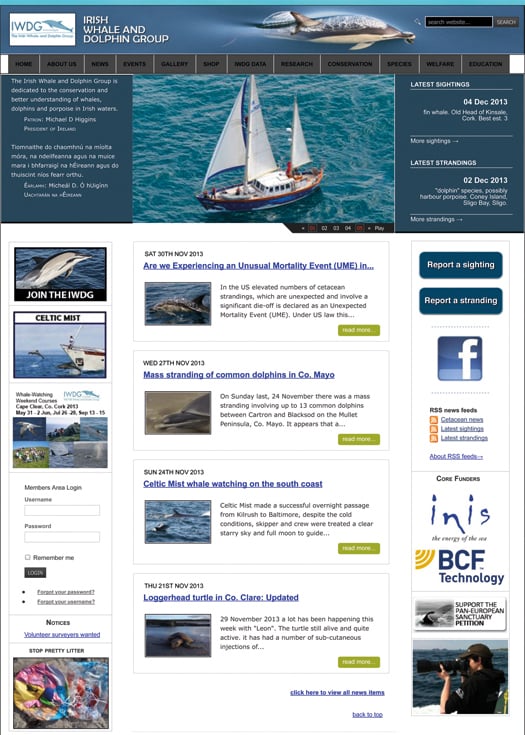
The Irish Whale and Dolphin Group knows how to put the power of the web to its advantage, using its website as a platform to educate about the many species of whale, dolphin and porpoise that frequent Ireland's shores - and get the public involved in gathering data on sightings and strandings (both can be reported directly on the site) to assist in its important conservation work. The site's news and events sections are regularly updated, and the IWDG also reaches out via a very active Facebook page with thousands of followers.
Afloat.ie will be promoting maritime web initiatives throughout 2014. Please get in touch with any website information, enewsletters or social media campaigns
Eight Marine Foods & Biotecholgy Projects to Receive €4.5m
#oceanwealth – Eight marine foods and marine biotechnology related projects will receive €4.5m from the Food Institutional Research Measure (FIRM) 2013.
Dr Peter Heffernan, CEO, Marine Institute welcomed the announcement by Simon Coveney, T.D., Minister for Agriculture Food and the Marine of the successful projects to be funded by the Food Institutional Research Measure (FIRM).
"I congratulate the successful applicants - these projects are led by expert Principal Investigators who are internationally ranked in their field. Their creative scientific ability, coupled with outstanding reputations, has been instrumental in building the type of collaboration required to engage in high-level research. It brings new research expertise to the marine sector, creates focused research teams and generates new research talent. With successes as these, and following recent successes for marine foods and marine biotechnology researchers in highly competitive SFI and EU research calls, Ireland is well positioned to play a significant role in Horizon 2020 research projects."
The projects address a range of research challenges facing the marine foods sector including enhancing the quality of ready-to-eat crabs and lobster products and applying novel processing technologies to extend the shelf-life of fish. Significant amongst the projects is the focus on the use of marine bio-resources as the basis for food-health products. This includes projects that seek to exploit Ireland's seaweed resource, targeting its use as a source of prebiotic ingredients for compounds that improve brain health; and exploiting the anti-inflammatory effects of seaweed compounds on bowel disease. These projects rely on bioactive compounds extracted from seaweeds, and a related project will investigate how to optimise the chemical composition of some species of seaweed to enhance the yield of bioactives.
The funding will generate knowledge that will be accessible to Irish firms seeking to generate greater value from marine bioresources in developing food and health related products. This support for enterprise driven research activity is a direct contribution to the goals of Harnessing Our Ocean Wealth – which aim to build a thriving maritime economy based on healthy marine ecosystems.
Ireland's seafood and fisheries sectors have high-growth potential and are critically important to the Irish economy. The seafood sector currently employs 11,000 people with annual sales of €700 million, the challenge of Food Harvest 2020 is to increase revenue to €1 billion and employment to 14,000 by 2020.
The potential for marine biotechnology research to contribute to the development of new seafood products and functional ingredients is recognised in Harnessing Our Ocean Wealth – An Integrated Marine Plan for Ireland. The importance of food and health research, and sustainable food production and processing research, in enabling economic growth and job creation was highlighted in Ireland's research prioritisation exercise.
The Marine Institute has supported marine research projects to the value of €42.6m since 2007 under the Sea Change Programme, funded by the National Development Plan 2007-2013. These funds contributed to building research capabilities and have attracted new research expertise to work on marine foods related research.
Projects such as the joint Marine Institute - FIRM funded NutraMara, the national marine functional foods research programme, are delivering high quality, industry relevant outputs. NutraMara has created a solid research platform and generated new research capacity that is being used to develop functional food ingredients from marine bio-resources. The strength of NutraMara is reflected in the new FIRM awards, with five of the projects being led by NutraMara Principal Investigators.
Marine Science Students Complete Survey Onboard RV Celtic Voyager in Cork
#marinescience – Students of marine science from National University of Ireland, Galway (NUIG) and University College Cork (UCC) are designing and delivering their own survey onboard the RV Celtic Voyager in Cork this week as part of an accredited inter-institutional module in Multidisciplinary Offshore Operations in Marine Science, the first of its kind in Europe.
The unique module launched by the Strategic Marine Alliance for Research and Training (SMART) will provide undergraduate students with the detailed knowledge, skill sets and experience necessary to design, plan and execute a multidisciplinary marine scientific research survey. Dr Andy Wheeler, Head of Geology at UCC said: "This accredited sea going module will give participants a competitive edge in the International jobs market, as they get hands on experience working as a team to design and deliver their own survey onboard the national research vessel."
Based on a blended learning approach, teaching will be delivered using a combination of practical training onboard the national research vessel RV Celtic Voyager, classroom lectures, laboratory practical's and a suite of supporting online resources. The module was collaboratively designed and developed by experts from higher education institutes north and south of the border including Galway-Mayo Institute of Technology, National University of Ireland Galway, University College Cork and the University of Ulster with funding provided by National Digital Learning Resource (NDLR) with grant-aided shiptime provided by the Marine Institute's Sea Change programme.
Dr. Pauhla McGrane, Coordinator of SMART said: "The inter-institutional effort to produce a common blended-learning module within the SMART consortium is directly attributable to a strong, cohesive marine science community in Ireland and the common desire to collaborate on innovative forms of teaching that will ultimately benefit and add value to the student learning experience.
Dr. Martin White, lecturer in the School of Natural Sciences, NUI Galway added "The successful development and delivery of this common module by Higher Education Institutes, in association with the Marine Institute, will further strengthen existing partnerships and will facilitate the development of further synergies across the marine sector."
Dr. Peter Heffernan, CEO Marine Institute added: "This new SMART module also makes a contribution towards the achievement of key actions in the Government's Integrated Marine Plan Harnessing Our Ocean Wealth. The plan identifies the need to maintain and build capacity (people) to meet the needs of the maritime sector e.g. through tailored education and training programmes. It is also an important step towards establishing Ireland as an international marine training destination."
The module introduces students to a multidisciplinary ecosystem approach to study the marine environment using the core disciplines of oceanography, benthic ecology, fisheries biology and geosciences. Teaching will focus on the practical, cross‐disciplinary skills involved in sample acquisition and processing, deployment and operation of equipment and instrumentation and data acquisition, processing and analysis of these data. Other elements essential in carrying out research surveys at sea will be examined, including safety at sea, survey design and planning, post‐survey analysis and assessment, vessel activities and capabilities, and vessel familiarisation and orientation.
Students will also be presented with an environmental impact assessment scenario which requires them to collaborate to design a baseline survey of their own and formulate a plan to execute it. Assessment will be based on the submission of a survey report which will include data analysis and interpretation.
See www.smartseaschool.com for more information on the programme and www.ouroceanwealth.ie for the report Harnessing Our Ocean Wealth
The Strategic Marine Alliance for Research and Training (SMART is an inter-institutional marine science partnership programme designed to further develop national capacity for carrying out offshore research operations onboard research vessels for third level students of marine-related sciences.
Collaborating partners within the alliance represent key marine science departments from a broad spectrum of institutions. These include:
Cork Institute of Technology (CIT)
Galway-Mayo Institute of Technology (GMIT)
Higher Education Authority (HEA)
Marine Institute (MI)
National Maritime College of Ireland(NMCI)
National University of Ireland Galway (NUIG)
University College Cork (UCC)
University of Ulster (UU)



























